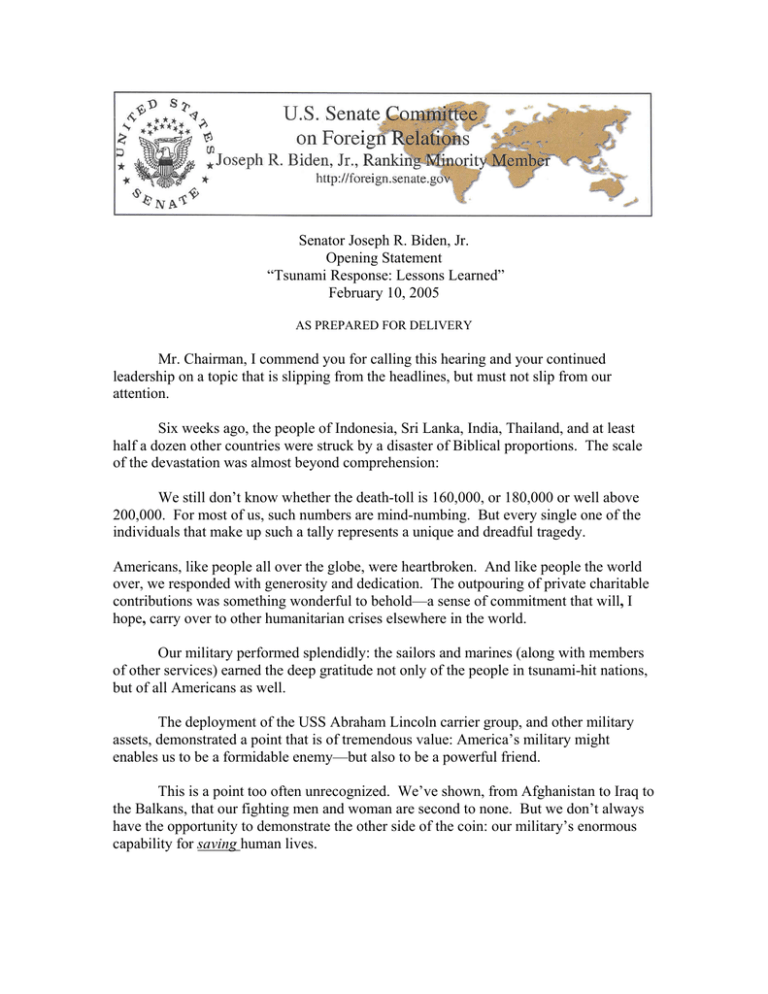Senator Joseph R. Biden, Jr. Opening Statement “Tsunami Response: Lessons Learned”
advertisement

Senator Joseph R. Biden, Jr. Opening Statement “Tsunami Response: Lessons Learned” February 10, 2005 AS PREPARED FOR DELIVERY Mr. Chairman, I commend you for calling this hearing and your continued leadership on a topic that is slipping from the headlines, but must not slip from our attention. Six weeks ago, the people of Indonesia, Sri Lanka, India, Thailand, and at least half a dozen other countries were struck by a disaster of Biblical proportions. The scale of the devastation was almost beyond comprehension: We still don’t know whether the death-toll is 160,000, or 180,000 or well above 200,000. For most of us, such numbers are mind-numbing. But every single one of the individuals that make up such a tally represents a unique and dreadful tragedy. Americans, like people all over the globe, were heartbroken. And like people the world over, we responded with generosity and dedication. The outpouring of private charitable contributions was something wonderful to behold—a sense of commitment that will, I hope, carry over to other humanitarian crises elsewhere in the world. Our military performed splendidly: the sailors and marines (along with members of other services) earned the deep gratitude not only of the people in tsunami-hit nations, but of all Americans as well. The deployment of the USS Abraham Lincoln carrier group, and other military assets, demonstrated a point that is of tremendous value: America’s military might enables us to be a formidable enemy—but also to be a powerful friend. This is a point too often unrecognized. We’ve shown, from Afghanistan to Iraq to the Balkans, that our fighting men and woman are second to none. But we don’t always have the opportunity to demonstrate the other side of the coin: our military’s enormous capability for saving human lives. It’s not a mere afterthought. As the two-star admiral in command of the USS Abraham Lincoln carrier group told a visiting Congressional delegation (and I’m paraphrasing a bit, since I wasn’t on board): “This isn’t a distraction from our job. This IS our job.” In humanitarian terms, there simply is no other institution in the world that could have delivered the assets and capabilities of the US military. From helicopters to water desalinization plants, the Navy had it all. And they got it on the scene within one week of initial call. In political terms, this represented an example of supremely effective—and costeffective—public diplomacy. It demonstrated a simple, yet all-too-often overlooked point: good deeds breed good will. But today’s hearing should not be a simple exercise in patting our own backs. There are things we did right—and things we could have done better. My purpose is, as the title of the hearing says, to see what lessons there are to be learned. Because, sadly enough, this will not be the last disaster (whether natural or manmade) that the world community will have to face. Some questions I’d like to explore in this hearing include: Yesterday, the Administration announced that it will increase our pledge for relief and reconstruction to $950 million – in other words, an additional $600 million over the $350 million already committed. I applaud the President. What can we do to insure full transparency for our pledge—so Americans, and the world, know that we are spending our money wisely? What can we do to ensure equal transparency on the part of the governments with which we are working? To be blunt, some of the governments in the afflicted countries have a history of endemic corruption, and some of their militaries have a poor record of respect for human rights. What can we do to ensure that our money gets to the afflicted people themselves—long after news cameras have decamped for other sites? And what can we do to ensure that our funding doesn’t help fuel civil conflicts, rather than help resolve them? Mr. Chairman, this tragedy is a challenge to the United States --- a challenge to demonstrate to the world just how generous and open-hearted the American people—and the American government—can be. A challenge to engage in cooperation with the world community. To show the world, and particularly the Muslim world, just what sort of powerful friend we can be. 2 We must meet this challenge. And I believe the Administration should be complimented for the way it has approached this. I welcome all of our witnesses, and I look forward to an informative and interesting hearing. # # # 3

